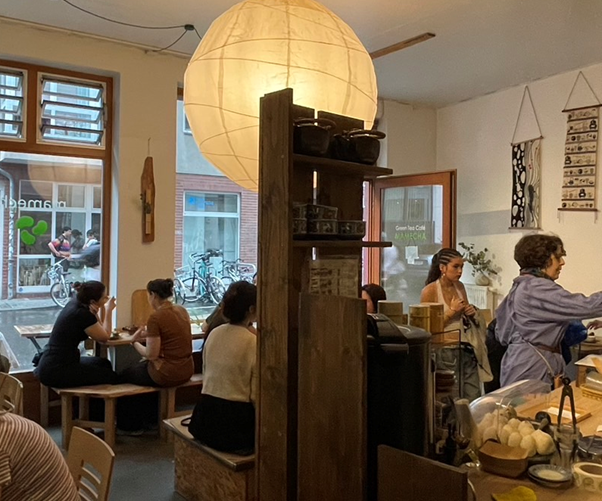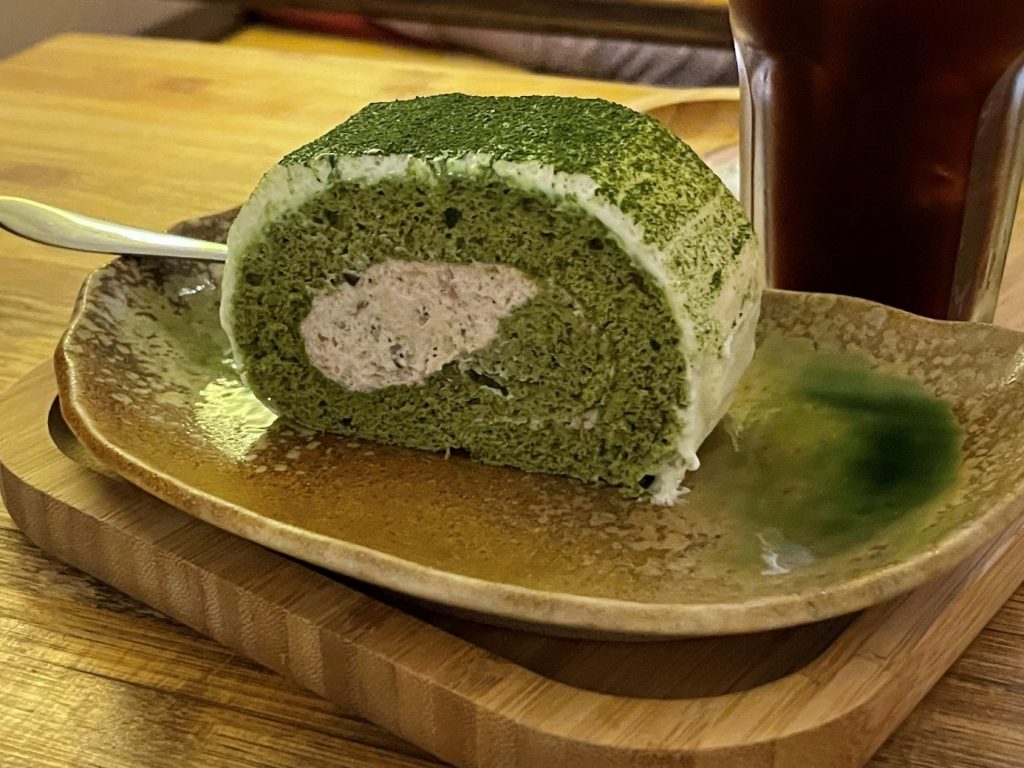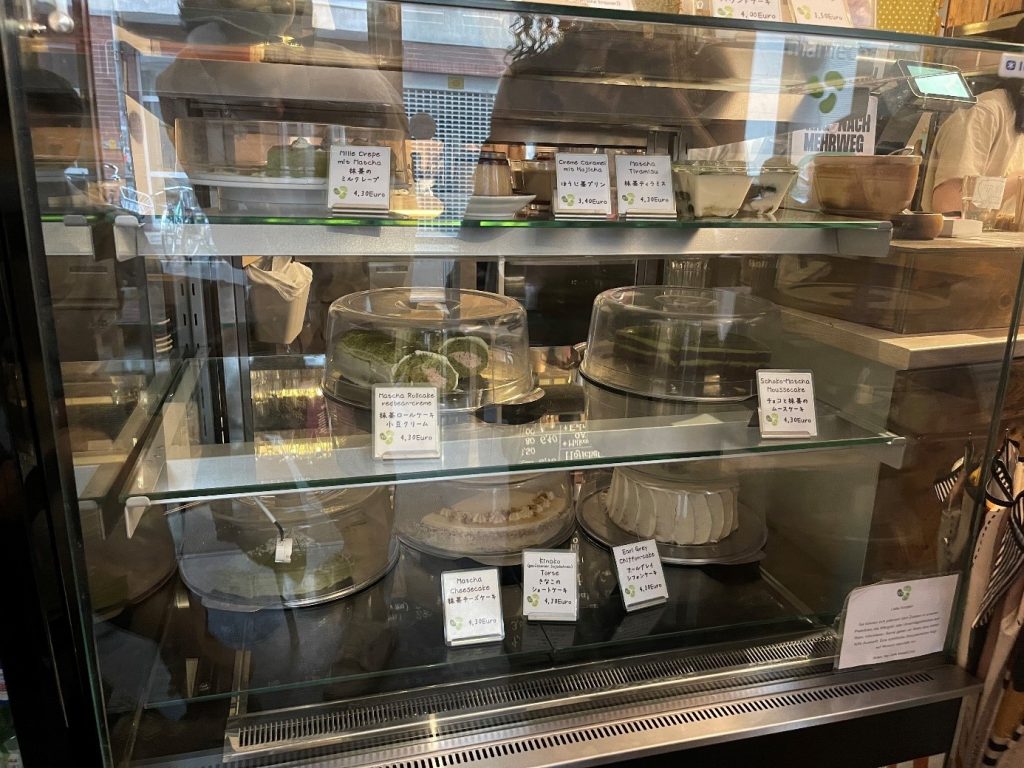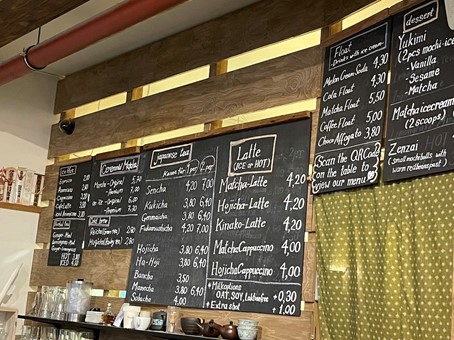by Cosmo H. and Jasper Domanowski
When we were assigned to visit Japanese restaurants as part of our course on Japanese cuisine in Berlin, we decided to visit Mulackstrasse instead of the more obvious choice of Kantstrasse. A smaller side street that branches off the main road near Hackescher Markt, Mulackstraße is much quieter than its bustling surroundings. We made Café Mamecha and the adjacent green tea shop, aptly named Mamecha no tonari, about halfway down the street, the focus of our research. The question we wanted to explore was whether and how these places tried to create a „Japanese atmosphere.“ Especially since there are a lot of Asian restaurants in Berlin, selling everything from sushi to pho, we wanted to see how a specifically „Japanese“ atmosphere was created, as opposed to just a vaguely „Asian“ one.

Copyright @ Cosmo H. 2024
First, we visited the tea shop Mamecha no tonari. The door opened into a cozy room with wooden shelves. The color palette of the entire store was subdued: darker browns contrasted with light walls, green and light blue splashes throughout the store from the bouquet that adorned the counter and from the various ceramics that were sold. Above all, the visible wood grain of the high shelves gave the store a somewhat rustic feel. Upon closer inspection of the tea selection, we noticed that the teas were labeled with German names and descriptions. In addition to the tea, you could also buy a ceramic bowl for mixing the matcha powder and matching tea sets. Everything seemed to indicate that if you were looking for an authentic Japanese green tea in Berlin, this was the place to go. This assumption seemed to be confirmed when a customer came in and asked the cashier specifically for recommendations for matcha latte, as she had been enthusiastic about her previous recommendation. Hearing this, we wanted to try the matcha latte for ourselves and went to the café next door.

Copyright @ Cosmo H. 2024
Mamecha is a bright and inviting café, with natural woods and light colors used for the interior. Just inside the entrance was a display case showcasing the various matcha-themed cakes and sweets for sale. The drink menu on the far wall listed a wide variety of green teas in English and German, while the displays in the case also listed the names in Japanese, mostly in katakana. We arrived around noon, so we decided to order their lunch options – a bento box and a curry with rice – and a piece of matcha crepe cake for dessert, all of which were delicious. As we ate, we felt like we were back in Japan – the smell of matcha, the staff chatting in Japanese, the soft music playing in the background – the whole atmosphere was just right. This sentiment was echoed by a customer who told us that she had visited Japan a few times, and whenever she felt „homesick“, she came to Mamecha for „a little piece of Japan.“

Copyright @ Cosmo H. 2024
At the end of our visit, we had a chat with the owner of Mamecha and Mamecha no tonari, who turned out to be the woman we had seen earlier behind the counter of the tea shop. She told us that the clientele was quite diverse. However, there were a considerable number of regulars, including Japanese nationals living in Berlin, who came from far away specifically for Mamecha’s matcha. We asked if it was intentional that Mulackstraße had several businesses related to Japan and Japanese cuisine, as there was not only a ramen shop but also a Japanese hairdresser on the same street. It was apparently a coincidence, she told us, as the other shops opened independently in the 15 years after Mamecha had opened. Although she did not know any of the owners personally, she recalled that the ramen shop was owned by a Vietnamese couple who employed a Japanese cook. She said, that it makes her happy to see that other people were so interested in Japanese cuisine and culture that they would open a restaurant dedicated to it. When the nearby ramen shop hired a Japanese chef and worked with him to create new vegan recipes for their restaurant, it showed to her that they really appreciated Japanese cuisine. It does not matter to her if someone was Japanese or not if they worked so hard to bring Japanese cuisine to more people.

Copyright @ Cosmo H. 2024
Both the green tea shop and the café successfully constructed a feeling of truly being in a Japanese space through subtle choices in their interior design. Instead of garish wall art of Mount Fuji to force the association, they evoke the feeling of being in a traditional Japanese tea shop through wooden furnishing and modest decoration in natural colours. The products are allowed to speak for themselves and gain a certain level of prestige by being associated with tradition. Additionally, both the café and the tea store being fully staffed by Japanese speakers adds to the perceived authenticity, which may well be something considered important to customers looking for Japanese green tea in particular.
Cosmo H. and Jasper Domanowski are students in the BA program „Japanese Studies“ at Freie Universität Berlin.
